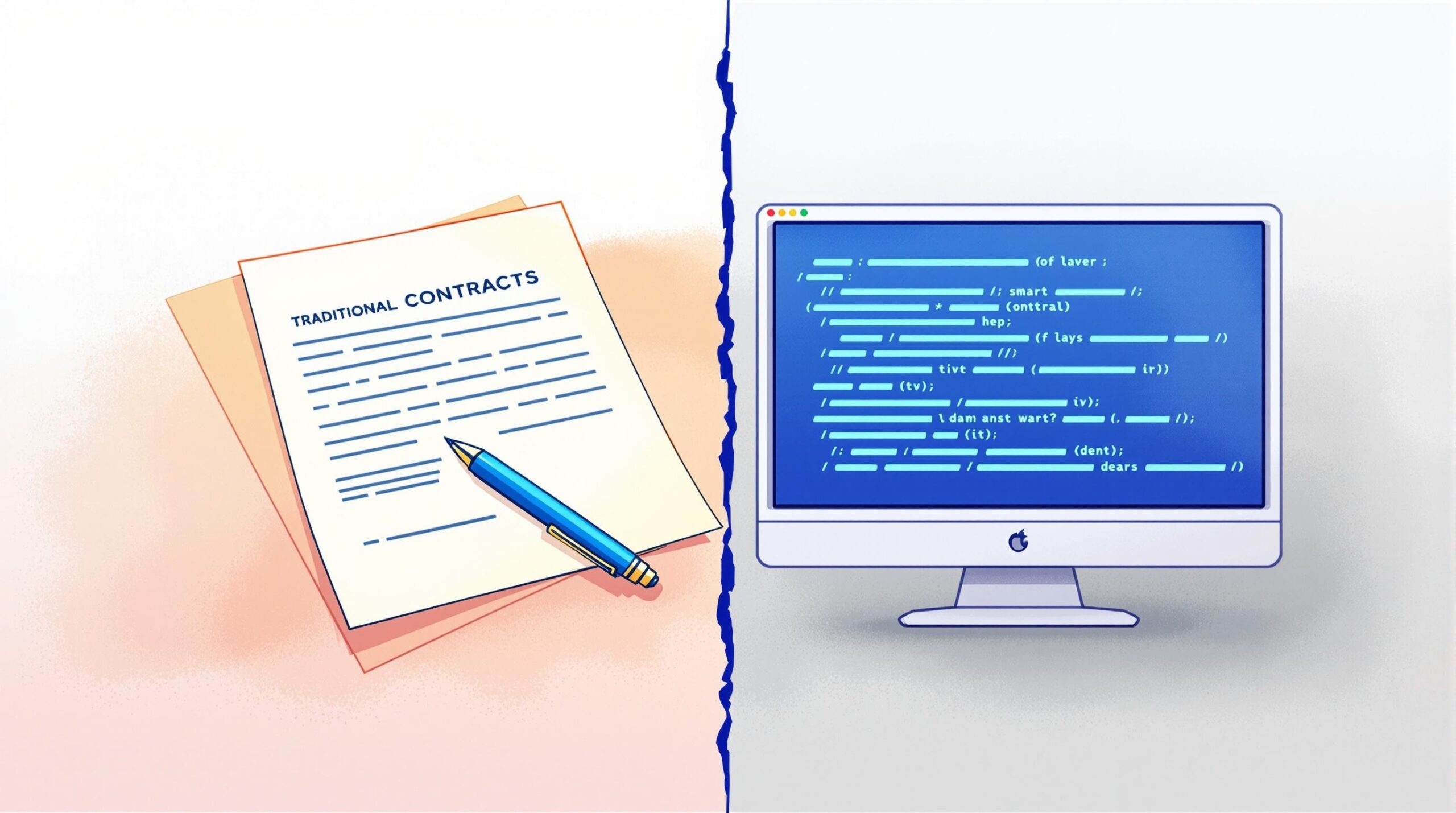Understanding Contracts: Smart vs. Traditional
Contracts are foundational to many business and legal transactions, serving as agreements between parties that outline rights, obligations, and terms. While traditional contracts are written agreements often requiring legal validation, smart contracts are digital and self-executing with predefined conditions coded into them. Understanding these contracts provides insights into their unique applications and advantages.
Traditional Contracts: A Tried and True Method
What makes a traditional contract? These are the documents many of us think of when we hear the word “contract.” They are paper-based, manually operated, and require validation through human oversight. Imagine buying a house or signing up for employment; these actions typically involve traditional contracts. Yet, how efficient are they?
What is a traditional contract? A traditional contract is a legally binding agreement between two or more parties that requires human verification and signatures to be enforced.
Traditional contracts are deeply rooted in trust and accountability. They often necessitate third-party involvement, such as notaries or lawyers, to ensure all parties meet the agreed terms. But here’s the catch: they can be drawn-out, costly, and susceptible to human error or dispute.
Smart Contracts: The Digital Revolution
Now, let’s dive into the world of smart contracts. Unlike their traditional counterparts, smart contracts live in the digital realm. They are based on blockchain technology, an innovation that brings self-execution and automation to agreements.
What is a smart contract? A smart contract is a self-executing digital agreement with terms and conditions written into code, enabling transactions without intermediaries.
Picture a digital ledger that automates every step of a business transaction. That’s the essence of a smart contract. When predefined conditions are met, the contract executes automatically. No waiting around, no middlemen, just efficient and streamlined operations.
Key Differences Between Smart and Traditional Contracts
The differences between traditional and smart contracts are like comparing a horse-drawn carriage to an electric car. Both get you from point A to B, but the journey is light years apart. Here are some fundamental distinctions:
- Execution: Traditional contracts require manual input and approval, while smart contracts automate execution through coded logic.
- Cost: Smart contracts reduce the need for intermediaries, cutting down on costs. Traditional contracts can be quite expensive due to legal and administrative fees.
- Security: Stored on a blockchain, smart contracts boast enhanced security, whereas traditional contracts can be vulnerable to fraud or tampering.
- Flexibility: While traditional contracts can be modified if needed, smart contracts, once deployed, remain immutable unless pre-programmed conditions allow changes.
How Jara Integrates Smart Contracts into the African Market
Jara is at the forefront of integrating smart contracts into the African digital asset economy. By leveraging $JARA, Africa’s financial landscape is undergoing significant transformation, offering enhanced financial inclusion and economic growth.
“Jara – Unlocking the Future to Africa’s Crypto Ecosystem”
Jara’s ecosystem involves tokenizing real-world assets—a potentially game-changing shift for sectors reliant on traditional contracts. Imagine investing in infrastructure projects like the Lagos airport using tokenized assets, all executed with the precision of smart contracts.
As Africa’s digital transformation accelerates, the implementation of smart contracts supported by $JARA provides transparency, security, and efficiency, perhaps heralding a new era of blockchain-driven opportunities. To grasp more about smart contracts and their implications for the DeFi sector, take a look at how smart contracts are revolutionizing DeFi.
Integrating smart contracts into traditional industries is not without challenges. Navigating this transition requires understanding both the technological benefits and the potential legal intricacies. To explore further, consider the broader implications of such technology in how AI and smart contracts are changing the future of automation.
Advantages of Smart Contracts Over Traditional Contracts
Efficiency and Cost Reduction
Smart contracts represent a paradigm shift from the conventional contract models. By automating processes, they eliminate the need for intermediaries who usually slow down transaction executions and inflate costs. Imagine a business environment where transactions are executed seamlessly without human intervention—this is the promise of smart contracts. They offer efficiency by embedding contractual terms directly into the code. So, when predefined conditions are met, the contract executes automatically.
What is a smart contract? A smart contract is a self-executing digital contract with terms of the agreement between buyer and seller directly written into lines of code.
The automated nature of smart contracts reduces human errors and mitigates the risk of fraud, which is often seen with traditional contracts. Consequently, businesses, especially those operating in cost-sensitive and time-critical sectors, can achieve significant cost savings. An example is within the supply chain industry where smart contracts streamline logistics and enhance efficiency.
Transparency and Security
One of the biggest advantages of smart contracts over their traditional counterparts is transparency. All parties involved have access to the terms of the contract, which are stored on a blockchain. This reduces any potential disputes arising from ambiguous language or misinterpretations. Furthermore, since the contract is stored across multiple nodes in a network, it is not controlled by a single entity, significantly enhancing security. Data breaches and unauthorized access, which are not uncommon in traditional contracts, are nearly impossible with smart contracts.
How do smart contracts ensure security? Smart contracts are executed on blockchain platforms that provide a decentralized ledger ensuring tamper-proof transactions.
This decentralized nature means that smart contracts are immutable, preventing modifications after the contract’s inception. Such features appeal to sectors dealing with sensitive data and high-security demands, like financial transactions, thereby reducing the risk and cost associated with securing such transactions traditionally.
Speed and Enforceability
Speed is another critical advantage of smart contracts. Unlike traditional contracts that may require several days, if not weeks, to finalize and execute, smart contracts process transactions almost instantaneously. Thanks to automation, elements like verification and settlement, which traditionally take time, happen without delay.
The enforceability of smart contracts is built into their framework. Once the coded conditions are met, execution occurs automatically without the need for additional legal checks or third-party verification. However, questions remain over their legal binding status across jurisdictions, a factor worth considering for cross-border transactions.
Can smart contracts replace lawyers? While they streamline many aspects of contract execution, the need for professional legal advice remains, especially concerning contract creation and interpretation.
Although the self-enforcing nature makes them powerful tools in automation, they don’t completely replace legal experts. Smart contracts offer a middle ground—reducing reliance on intermediaries while retaining the need for legal strategy, shaping their role within the broader legal system.
Revolutionizing Business Models
Smart contracts aren’t just transforming existing processes but are also paving the way for entirely new business models. They enable decentralized platforms, or DeFi, where traditional business models were limited by geographic or regulatory barriers. For instance, platforms like Jara are leveraging these contracts to build new investment opportunities in Africa. These opportunities are further facilitated by the use of native utility tokens like $JARA, which provide users with seamless access to new economic ecosystems.
Indeed, with the rapid evolution of blockchain technology, the realms of potential applications continue to expand. From insurance to real estate to logistics, smart contracts are steering the future of business into uncharted and promising territories. Are you prepared to embark on this digital revolution?

Limitations and Challenges of Smart Contracts
Despite their revolutionary potential, smart contracts do not come without their own set of limitations and challenges. Understanding these constraints is crucial if you’re considering leveraging this technology in your operations. Let’s delve into some of the most critical issues associated with smart contracts.
Pseudonymity: A Double-Edged Sword
Smart contracts thrive on the blockchain, where transaction parties are often pseudonymous. This pseudonymity might seem like an advantage, offering privacy and security. However, it complicates legal disputes significantly. When conflicts arise, parties only have wallet addresses for identification rather than verified legal identities. How do you resolve a dispute when the other party’s identity is cloaked in mystery? This can prove challenging, particularly in jurisdictions where legal recourse requires identifiable parties.
Pseudonymity complicates legal disputes because smart contracts operate with wallet addresses rather than identifiable parties.
Legal Ambiguity in the Blockchain Realm
The legal status of smart contracts is still an emerging area, leading to ambiguity. In many places, legislation hasn’t caught up with technology, leaving smart contracts in a grey area. Are these contracts enforceable under current legal frameworks? While some jurisdictions are moving towards recognizing them, others lag, offering little guidance for disputes and enforcement. As a result, users must tread cautiously to avoid unintended legal pitfalls.
Programming Errors and Execution Issues
A smart contract is essentially a piece of code. Like any software, it is susceptible to programming errors which can lead to costly execution issues. Imagine a scenario where a small error in the contract code leads to a loss of resources or unintended behaviors. Ensuring foolproof code demands expert development and rigorous testing processes, adding to the time and expense of implementation.
Programming errors in smart contracts can lead to execution issues, necessitating careful development and rigorous testing processes.
Rigidity and Immutability: Blessing or Curse?
Smart contracts are intended to be immutable once deployed, which is often hailed as a benefit. However, this rigidity becomes a curse when there is a need for amendments. Traditional contracts allow for negotiations and adjustments—which is not the case with smart contracts unless every party consents to creating an entirely new contract. This inflexibility might not suit scenarios where agreements require frequent updates or modifications.
High Technical Expertise Requirement
Adopting smart contracts, especially in environments less versed in technology, requires significant technical knowledge. Developers must understand blockchain dynamics, and stakeholders should be able to comprehend the technicality of the contract terms. This level of expertise can be a barrier for widespread adoption, particularly in regions like Africa that are rapidly evolving technologically.
In conclusion, understanding the limitations and challenges inherent in adopting smart contracts is crucial. By weighing these factors, businesses and legal entities can better determine when smart contracts are ideal and where traditional contracts may still hold ground. For more insights into how smart contracts operate within legal frameworks, consider exploring how they are implemented in decentralized finance.
The Future of Contracts: Potential Integrations and Innovations
The future likely holds a blend of smart and traditional contracts, leveraging the strengths of both to create hybrid solutions that retain the legal enforceability of traditional contracts while integrating the automation of smart contracts. As technology evolves, these hybrid models could redefine contract landscapes across diverse sectors.
Imagine combining the legal robustness of a traditional contract with the speed and automation of a smart contract. Such a hybrid could offer the best of both worlds. What would this mean for businesses and individuals navigating Africa’s burgeoning digital economy?
The hybrid contract model can provide legal protection alongside blockchain efficiency, ensuring secure and automatic enforcement of terms.
The Rise of Hybrid Contracts
Hybrid contracts could emerge as a powerful tool in streamlining business operations by maintaining the flexibility of traditional contracts while embracing technological advances. Africa, with its technological leapfrogs, could particularly benefit from these innovations, integrating new financial products, such as those offered by $JARA, into existing frameworks.
- Efficiency: Hybrid contracts can cut down on time by automating simple transactions and preserving complex negotiations for human oversight.
- Cost Reduction: With less need for intermediaries, these contracts can save money, making them attractive in markets like Africa with growing economic digitalization.
Innovative Sectors Integrating Contracts
The potential of hybrid contracts is expansive, touching various sectors. For example, in the real estate industry, tokenized assets supported by these contracts can provide transparency and streamline processes, as seen in projects like the Lagos airport tokenization by Jara. The impacts are transformative:
- Supply Chain Management: Smart elements can enhance tracking and verification, while traditional components ensure compliance with local legal frameworks.
- Gaming Industry: Smart contracts can revolutionize how assets are traded and ownership is verified in virtual worlds.
- Asset Management: These contracts can simplify the tokenization of physical assets, making them easily tradable on platforms like Jara.
Enhancing Legal Enforceability
Combining the best attributes of smart and traditional contracts—legal enforceability with operational efficiency—could usher in new opportunities. In regions like Africa, where infrastructure is expanding, the adoption of these technologies is crucial.
The future of contracts in developing markets can be greatly influenced by technology, allowing for safer, faster, and more transparent agreements.
These hybrid contracts not only open doors to new industries but also align with Jara’s mission of democratizing financial opportunities in Africa. By adapting quickly to technological shifts, countries can capitalize on their expanding digital economies.
Conclusion: The Path Forward
As we look to the future, the integration of smart technologies into conventional contracts appears inevitable. For areas like Africa, with fast growth in digital assets, this integration isn’t just an opportunity—it’s a necessity. Companies and individuals embracing these changes stand to gain significantly in efficiency and scope. Keep an eye on developments from innovators like Jara that continue to bridge global capital to African assets.

Are smart contracts legally enforceable?
Smart contracts are legally enforceable when they meet the required legal standards and are recognized by a jurisdiction’s laws. Current legal systems differ on recognition, but smart contracts enforce their terms automatically when predefined conditions are met, which can complement traditional legal validation.
How do smart contracts reduce the risk of fraud?
Smart contracts reduce the risk of fraud by executing transactions only when all predefined conditions are met, thus eliminating the need for intermediaries. This reduces human intervention, making fraudulent alterations less likely. As all parties agree on conditions beforehand, transparency is increased, further minimizing fraud potential.
What industries benefit most from smart contracts?
Industries that benefit most from smart contracts include finance, supply chain, real estate, healthcare, and gaming. These sectors leverage the automation and reliability of smart contracts to streamline operations, reduce costs, and mitigate risk. The capability for real-time execution and accuracy supports immense potential for innovation and efficiency in these fields.
Can smart contracts replace lawyers?
Smart contracts are unlikely to completely replace lawyers as they lack the interpretative and advisory roles legal professionals provide. While they automate and streamline processes, complex legal nuances and disputes often require human judgment that only lawyers can offer, pointing to a future of collaborative integration rather than replacement.

Related Practice Areas
Explore more about our services through these related practice areas pages:
Hear From Our Satisfied Clients
Our dedication to excellence in Smart Contracts & Automation is evident in every case we undertake. The positive feedback from our clients is a testament to the hard work and dedication we consistently deliver.

Explore Smart Contracts with Expert Guidance
Smart contracts can revolutionize your business transactions, offering efficiency, transparency, and security that’s unparalleled. But how do they stack up against traditional contracts? Our expert legal team at Jara is ready to guide you through the complexities to ensure you make the best choice for your needs.
Our dedicated lawyers have the deep industry knowledge and personalized approach needed to address any concerns you may have regarding Smart Contracts. Whether you’re eager to embrace automation or have reservations about transitioning from traditional contracts, we’re here to clarify and guide.
Visit us at www.getjara.xyz or download the Jara app to stay informed about legal and business trends that matter to you—available on Android and iPhone.
Why Choose Jara? Because we believe in bridging global capital to African assets with innovation and integrity.
Have questions about how we can help you navigate the future of smart contracts? Contact us by email at [email protected], and let’s get started on securing your business’s future today.
Understanding Smart Contracts vs. Traditional Contracts
In today’s fast-paced digital world, the debate between smart contracts and traditional contracts continues to grow. Both play crucial roles in business transactions, but they differ significantly in their operations and benefits.
What Are Smart Contracts?
Smart contracts are self-executing contracts with the terms directly written into code. These rely on blockchain technology to automatically enforce and verify transactions without the need for intermediaries.
Smart contracts minimize risks of fraud and errors by eliminating intermediaries through automation, ensuring quick and secure contract execution.
What Are Traditional Contracts?
Traditional contracts involve legal agreements enforced by law, typically requiring lawyers or other mediators to oversee their validity and execution. They are usually in paper format or electronically signed documents.
Key Differences Between Smart and Traditional Contracts
- Execution: Smart contracts self-execute when conditions are met, while traditional contracts require human intervention.
- Cost: Traditional contracts often have higher costs due to legal fees, whereas smart contracts reduce these through automation.
- Security & Trust: Smart contracts use blockchain for transparency and security, while traditional contracts rely on the trust and reputation of parties involved.
“Smart contracts are set to revolutionize the legal landscape, promoting efficiency and reducing errors.” – Tech Innovator
Pros and Cons of Each Contract Type
| Contract Type | Pros | Cons |
|---|---|---|
| Smart Contracts | Automated, cost-effective, secure | Complex setup, reliant on technology, legal ambiguity |
| Traditional Contracts | Legally recognized, well-understood, flexible | Higher costs, slower process, risk of human error |

















